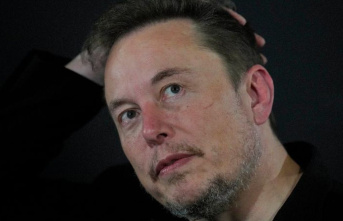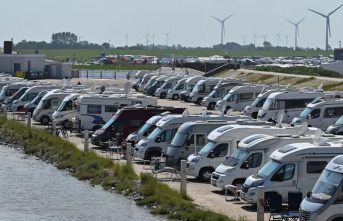China's economy is expected to grow by "around five percent" this year. Prime Minister Li Keqiang named this goal in his statement of accounts at the beginning of this year's session of the Chinese People's Congress on Sunday in Beijing.
After the end of the strict zero-corona policy, the focus this year should be on economic recovery. A slightly higher level of new borrowing is therefore planned to stimulate the economy. According to the government's draft budget, which was also published on Sunday, the deficit should be around three percent of economic output. A deficit of 2.8 percent was planned for 2022.
The growth target of five percent is at the lower end of what analysts expect. They had partly expected that China could even aim for a target of six percent. Beijing is planning rather cautiously.
The country relies on consumption
"This year, it is important to prioritize economic stability," Li Keqiang said in his work report. In particular, measures would have to be taken to stimulate consumption.
Major projects that have already been decided on in the government's current five-year plan are to be pushed ahead more quickly. Additional urban renewal projects are also included in the budget. There should also be additional transfer payments from Beijing to the local governments.
Li Keqiang also announced that 12 million new urban jobs will be created this year -- a million more than last year's plan. The government is targeting an unemployment rate of around 5.5 percent. Inflation is expected to be around 3 percent.
In the previous year, China had aimed for growth of 5.5 percent, but ultimately failed to achieve this in the corona pandemic due to the burden of lockdowns, forced quarantines and mass tests. Only three percent could be achieved in 2022 - the second worst growth rate since 1976 and only slightly more than 2020 at the beginning of the pandemic with 2.2 percent.
Brief euphoria after lifting the corona measures
The lifting of the strict corona measures triggered a short-term downright euphoria among many companies in China. China's Purchasing Managers' Index rose to its highest level in more than a decade in February. The International Monetary Fund (IMF) expects growth of 5.2 percent for this year.
However, the list of construction sites and problems remains long: there are signs of a strong recovery, at least for this year. But the real estate market, which is so important for China, is only slowly getting back on its feet after the turbulence of the previous year. The government pledged "effective risk prevention" for the sector on Sunday. At the same time, however, an attempt must be made to prevent an "unregulated expansion" of the real estate market.
One of the biggest long-term concerns for the Chinese economy is also the country's demographic situation. The population shrank last year for the first time in decades. Models predict that India will become the most populous country this year.
For Li Keqiang, it was the last statement of accounts in his capacity as prime minister. He is to be replaced in the government reshuffle next week by Li Qiang, the previous party leader in Shanghai. The 63-year-old is not seen as an ideologue or a simple yes-man, but rather as a pragmatic manager.
Traditionally, economic planning in China rests with the prime minister. This division has suffered under Xi Jinping, who has concentrated power more closely. He has long since made all the important decisions himself.






